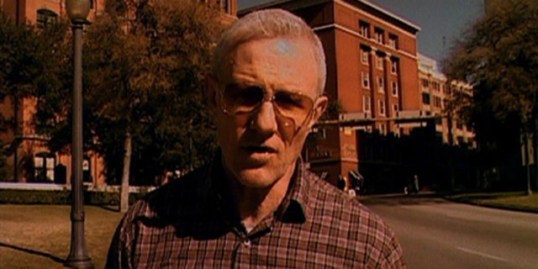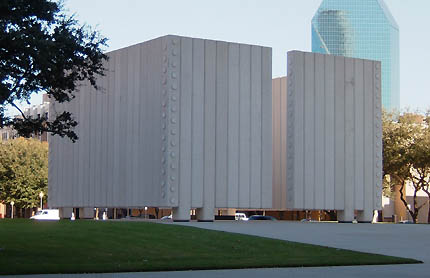 When I first decided to do this series of reviews of conspiracy-themed films, I knew that I would eventually have to review the 1991 Oliver Stone film JFK.
When I first decided to do this series of reviews of conspiracy-themed films, I knew that I would eventually have to review the 1991 Oliver Stone film JFK.
JFK is one of those films that continues to divide audiences. Those who think that John F. Kennedy was killed by a conspiracy tend to love this film and are given to describing JFK as being “one of the most important films ever made.” Those who believe that Lee Harvey Oswald was the lone assassin dismiss Stone’s film as being left-wing propaganda. Just check out the message board at the imdb if you need evidence of just how worked up people get over this film and its subject matter.
It seems that very few of the people who criticize or praise JFK ever review it as a work of cinema. Instead, they focus on the film’s politics. If I criticize the film for wasting the talents of Sissy Spacek or featuring one of Kevin Costner’s least interesting performances then I’m running the risk of having to deal with angry conspiracy theorists telling me that I need to open my eyes to the reality of American history. On the other hand, if I praise Tommy Lee Jones’s wonderfully decadent turn as one of the film’s conspirators, chances are that someone is going to accuse me of being a naive leftist.
Then again, perhaps that reaction is to be expected. Oliver Stone is one of our most political and least subtle filmmakers. His movies are specifically designed to challenge the status quo. For that reason, it’s not surprising to discover that Stone considers JFK to be the best of all of his films.
JFK is based (rather loosely, some claim) on the true story of New Orleans District Attorney Jim Garrison (played by Kevin Costner) and how, in 1967, he charged businessman Clay Shaw (played by Tommy Lee Jones) with being a part of a conspiracy to kill John F. Kennedy. Shaw was eventually acquitted and both Jim Garrison and his investigation remain controversial to this day.
JFK courts controversy immediately with its portrayal of Jim Garrison. I’ve read several accounts of the Garrison investigation and the one thing that they all seem to agree on is that Jim Garrison was a flamboyant, bigger-than-life figure who enjoyed publicity. Even among those who believe that Garrison uncovered some valuable evidence as a result of his investigation, there is a good deal of ambiguity about Garrison’s motives. However, in Stone’s film, Jim Garrison is played by Kevin Costner and is portrayed as being an incorruptible, all-American idealist. It’s not that Costner gives a bad performance. Instead, it’s just a rather uninteresting one, especially when one compares Costner’s Garrison to some of the stories about the real-life Garrison.
However, as the film unfolds, it becomes obvious that Stone is using Costner’s blandness to the film’s advantage. Over the course of three hours, JFK slowly peels back layers of secrecy and cover-ups and reveals the shadow world that, according to Stone, lurks underneath everyday reality. Costner’s Garrison might not be interesting but he is a stable presence. He anchors the film, giving us someone to relate to while the film itself grows more and more bizarre.
While Costner’s might give the least interesting performance of his career in this film, the same cannot be said of the rest of the cast. JFK is full of familiar faces, many of whom are only on-screen for a few minutes but all of which play an important role in creating Stone’s shadow universe. Kevin Bacon, Gary Oldman, Joe Pesci, Michael Rooker, Donald Sutherland, and Tommy Lee Jones; they all have small roles but every single one of them makes an undeniable impression. Whether you agree with the film’s conclusions are not, it’s impossible not to enjoy JFK for the chance to spot a bunch of familiar faces giving memorably bizarre performances.
But ultimately, its impossible to review JFK without considering the film’s conclusions. JFK makes the case that John F. Kennedy was killed as the result of a massive right-wing conspiracy that involved the military, business interests, the CIA, the FBI, anti-Castro Cubans, and the mafia. By the end of the film, the question becomes less who killed JFK and more who didn’t kill JFK.
Myself, I’m not going to claim to be enough of an expert on the Kennedy assassination to argue whether JFK is accurate or if it’s just propaganda. However, as a film reviewer, I can say that it’s a very well-made and powerful film but it’s also one of those films that works better the first time you see it than the second time.
The first time you see it, the film overwhelms you. It leaves you convinced that yes, there was a conspiracy and yes, everyone was involved and yes, Jim Garrison was right! It convinces you so thoroughly that you end up using exclamation points, just to make sure everyone knows how convinced you are.
However, with each subsequent time that you view JFK, you became a bit more aware of just how manipulative and one-sided it truly is. You become a bit more aware of the technique underneath the outrage and, if you’re a smart film watcher, you remember that JFK is a recreation as opposed to being a historical document. You become more and more aware that Stone approached the material with a destination in mind and, like any good director, he has specifically shaped the material to make sure that you reach that destination at the end of the journey.
That was certainly my experience with JFK. I first saw it in high school and it convinced me that JFK was the victim of a conspiracy. Then, when I was in college, I watched it for a second time and, though I still believed the film’s conclusions, I also found myself much more aware of how the film’s length and Stone’s direction were designed to beat the audience into submission. When I saw the film a third time, I found myself resenting the film’s manipulative nature and, as a result, I found it a lot more difficult to accept Stone’s conclusions.
However, when I rewatched the film last night for this review, I was surprised to discover that JFK actually holds up pretty well. It’s still way too long (and, unlike a lot of other reviewers, I am not impressed by the droning speech that Costner delivers at the end of film) and Stone’s lack of subtlety does backfire on a few occasions. However, perhaps because I was finally watching the film as entertainment as opposed to judging the film on its political or historical merits, I discovered that JFK is a watchable and entertaining film, one that does a pretty good job of making Stone’s case. If nothing else, it’s worth watching just for the chance to see the wonderfully snarky performances of Tommy Lee Jones, Kevin Bacon, and Gary Oldman.
Perhaps the best thing that I can say about JFK is that its the type of film that will inspire smart people to do their own research and come to their own conclusions, which may or may not be the same conclusions that Oliver Stone reaches.
And, honestly, isn’t that the most that we can ask of any film?









 November 22, 1963. While the rest of the world deals with the aftermath of the assassination of John F. Kennedy in Dallas, a man named Michael Curtis drives a jeep across the South Texas desert, heading for the border. In the jeep, he has a $800,000 and a high-powered rifle. When the jeep crashes, the man, the rifle, and the money are left undiscovered in the desert for 21 years.
November 22, 1963. While the rest of the world deals with the aftermath of the assassination of John F. Kennedy in Dallas, a man named Michael Curtis drives a jeep across the South Texas desert, heading for the border. In the jeep, he has a $800,000 and a high-powered rifle. When the jeep crashes, the man, the rifle, and the money are left undiscovered in the desert for 21 years.








